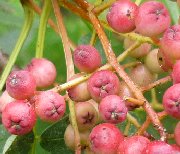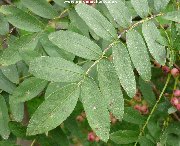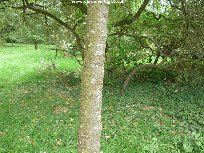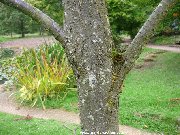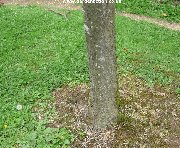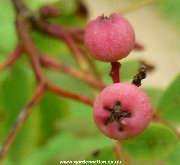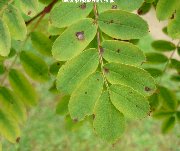Categories
Calendars
Guides
Reviews
Archive
Gallery
Articles
Ask Our Gardening Expert
Identify the Hupeh Rowan (sorbus hupehensis)
CLICK ANY PICTURE ON THIS PAGE TO ENLARGE IT Hupeh Rowan (sorbus
hupehensis) It will grow in many soils including clay as long as it is free-draining.
It is especially good for windy areas. It is native to west China (specifically the province
of Hupeh from which it takes its name) but is now readily found
in parks, gardens and arboretum in many parts of the world. With flowers, berries and autumn
red leaves this tree is of interest throughout much of the year.
The berries of sorbus hupehensis. The berries vary in colour from light pink to a
much darker pink as shown on the left.
The individual berries are about �cm (�in) in diameter and appear from late August
onwards and tend to stay on the tree late into the winter, birds permitting.
The leaves of sorbus hupehensis are distinctive because they are toothed only at
the ends of the individual leaves. Click the picture on the left to see this feature
more clearly.
Individual leaflets are long and narrow with between 11 to 15 on each stem. When they
first emerge they are a slightly blue shade of green. In late autumn the leaves turn
orange to red.
PICTURE OF FLOWERS COMING SOON
The creamy white flowers of the Hupeh Rowan open in mid-May. The most common cultivar is sorbus hupehensis 'Rosea', also known as
sorbus hupehensis var. obtusa, see the pictures below. Sorbus
hupehensis 'Rosea' The most distinguishing of the 'Rosea' cultivar is the form of the
leaves. The 'Rosea' cultivar has shorter but wider leaves compared to the basic
sorbus hupehensis.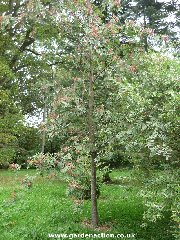
Sorbus hupehensis, click to enlarge
An excellent tree for many gardens. Its unusual light pink berries are very unusual
and attractive.
The eventual maximum height of the Hupeh Rowan is about 10m (32ft) making
it very suitable for medium sized gardens. As with all Rowans / Mountain Ash this is a
deciduous tree which is extremely hardy.
